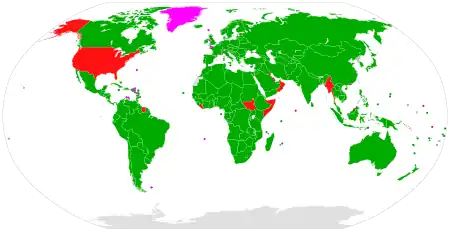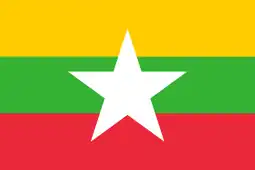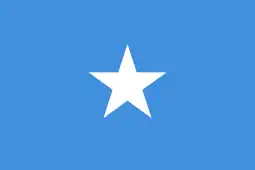Equal Remuneration Convention
The Convention concerning Equal Remuneration for Men and Women Workers for Work of Equal Value, or Equal Remuneration Convention is the 100th International Labour Organization Convention and the principal one aimed at equal remuneration for work of equal value for men and women. States parties may accomplish this through legislation, introduction of a system for wage determination and/or collective bargaining agreements. It is one of 8 ILO fundamental conventions.[1]
| C100 | |
|---|---|
| ILO Convention | |
| Date of adoption | 29 June 1951 |
| Date in force | 23 May 1953 |
| Classification | Equal Remuneration Women |
| Subject | Equality of Opportunity and Treatment |
| Previous | Minimum Wage Fixing Machinery (Agriculture) Convention, 1951 |
| Next | Holidays with Pay (Agriculture) Convention, 1952 |
Non-ratifiers

As of October 2022, the convention had been ratified by 174 out of 187 ILO member states. ILO member states that have not ratified the convention are:[2]
 Bahrain
Bahrain Brunei
Brunei Cook Islands
Cook Islands Kuwait
Kuwait Marshall Islands
Marshall Islands Myanmar
Myanmar Oman
Oman Palau
Palau Qatar
Qatar Somalia
Somalia Tonga
Tonga Tuvalu
Tuvalu United States
United States
The convention has been extended by France to cover French Guiana, Guadeloupe, Martinique, and Réunion. New Zealand has extended the convention to Tokelau. It has not been extended to Aruba, Curaçao, Sint Maarten, or the Caribbean Netherlands within the Kingdom of the Netherlands.[3]
References
- "Conventions and ratifications". International Labour Organization. 27 May 2011.
- "Countries that have not ratified the Equal Remuneration Convention". International Labour Organization. 30 June 2017. Retrieved 30 June 2017.
- "Detailpagina Verdragenbank; Verdrag betreffende gelijke beloning van mannelijke en vrouwelijke arbeidskrachten voor arbeid van gelijke waarde". Ministry of Foreign Affairs (Netherlands) (in Dutch). Retrieved 27 May 2011.
External links
- Text and ratifications